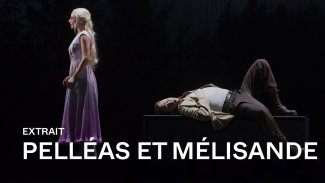



Gordon Bintner
A native of Canada, Gordon Bintner built his broad operatic repertoire firstly as a young artist at Canadian Opera Company, and subsequently in the ensemble of Oper Frankfurt. Now a rising star on the operatic landscape, he has made a series of impressive debuts in recent seasons and is praised as much for his warmth of tone as for his compelling stage presence.
Bintner’s 2024/25 season opens with a return to Royal Ballet and Opera, Covent Garden as Tchaikovsky’s Eugene Onegin in a new production by Ted Huffman, conducted by Henrik Nánási. At Opéra National de Paris he makes a role debut as Debussy’s Golaud in a new staging by Wajdi Mouawad of Pelléas et Mélisande, conducted by Antonello Manacorda and makes two company debuts as Mozart’s Conte Almaviva (Le nozze di Figaro), at Lyric Opera of Chicago and, at Opera Australia. In concert, Bintner joins The Cleveland Orchestra and Bernard Labadie for Bach, Easter Oratorio and Magnificat, and Vancouver Symphony Orchestra and Otto Tausk for Beethoven, Symphony No.9.
In recent seasons, Bintner has made notable debuts at Opéra National de Paris as Junior in Bernstein’s A Quiet Place under Kent Nagano, at Royal Ballet and Opera, Covent Garden as Guglielmo in Così fan tutte conducted by Julia Jones, at San Francisco Opera in Robert Carsen’s classic production of Eugene Onegin, at Opéra national de Lyon in the title role of Le Nozze di Figaro under Alexandre Bloch and at Teatro Regio di Torino as Ruggiero in Halévy’s La Juive, conducted by Daniel Oren. Further European highlights include both Oronte in Charpentier’s Médée under William Christie and Guglielmo in Così fan tutte under Pablo Heras-Casado at Opéra National de Paris and Albert in Werther, conducted by Sir Antonio Pappano at the Royal Ballet and Opera, Covent Garden.
See more
A regular guest at Canadian Opera Company, Bintner has appeared before his home audience as Eugene Onegin, Belcore (L’Elisir d’amore), Papageno (Die Zauberflöte), Count Almaviva and, most recently, as Mozart’s Don Giovanni. Elsewhere in North America, he has performed as both Lescaut in Massenet’s Manon and Don Giovanni at Opéra de Montréal, Papageno at Michigan Opera Theatre and, in concert, as both Guglielmo and Count Almaviva in a da Ponte trilogy with Milwaukee Symphony Orchestra under Edo de Waart and as Figaro (Le Nozze di Figaro) with NAC Ottawa under Music Director Alexander Shelley.
During his six seasons as a member of Oper Frankfurt’s ensemble, Bintner demonstrated impressive repertoire versatility including Argante (Rinaldo), Chorèbe (Les Troyens), Graf (Capriccio), Harlekin (Ariadne auf Naxos), Count (Schreker’s Der ferne Klang), Vladislav (Smetana’s Dalibor), Escamillo (Carmen) and Don Polidoro (Cimarosa’s L’italiana in Londra) and as a graduate of its prestigious Young Singers Project, he has performed at Salzburg Festival as Astolfo in Donizetti’s Lucrezia Borgia, conducted by Marco Armiliato, as Phorbas in Enescu’s Oedipe under Ingo Metzmacher and as the Herald in Verdi’s Otello under Christian Thielemann.
Bintner recently joined Orchestre symphonique de Montréal as Joseph in Berlioz’s L’enfance du Christ under Hervé Niquet, and as an avid recitalist, made his debut at London’s historic Wigmore Hall with acclaimed pianist Kirill Gerstein in a programme of Busoni, Beethoven and Weill and at Montréal’s Salle Bourgie together with accompanist, Michael McMahon, in Brahms, Finzi, Schubert and Schumann.
Gordon Bintner’s discography includes Junior in Bernstein’s A Quiet Place recorded with Orchestre symphonique de Montréal and Kent Nagano (Decca Classics, 2018) and the Count in Schreker’s Der ferne Klang (OehmsClassics, 2021).
Contacts
Shirley Thomson Senior Director, VOICE at HarrisonParrott | Head of CSR
General Management
General Management
Gallery



“Gordon Bintner’s Count nailed the exasperation at knowing he’s being tricked over and over, even if he can’t figure out how. His timing and facial gestures showed a keen sense of humour.”
“From the opening poolside encounter with Mélisande, Binter imposes vocally with his bronzed timbre that initially suggests a powerful charm.”
“Bintner fields a lyrical baritone with beauty and resonance, and sings splendidly.”
“Gordon Bintner’s supple yet hard-edged baritone captures Onegin’s destructive self-importance.”
“Gordon Bintner was mesmerising in the title role (Eugene Onegin), inflecting his virile baritone with a wealth of vocal colour. He too chartered the character’s development unerringly, from a boorish prig at the start to a desperate, almost unhinged figure at the end. Indeed the sense of danger in his final confrontation with Tatyana, played out on a bare stage, was palpable. Overall this was a magnetic performance.”
“Binter was a vocally handsome Albert”
“…this revival benefited from an excellent ensemble cast, led by the former COC ensemble baritone Gordon Bintner as an ideal Count, his beautiful, warm baritone and commanding stage presence a pleasure”
“Gordon Bintner has a glorious sound and a willing, enthusiastic manner which brought to mind the young Olaf Bär.”
“Gordon Bintner (Don Polidoro), a virile baritone and a great comedian..”
“Gordon Bintner, recent grand prize winner of the OSM competition, is the star of the show. Tall, blond, seductive, he has everything a Don Giovanni needs, and better yet, he acts well and he sings well. This man will certainly have a big career.”
“By far the most finished was the baritone of Gordon Bintner, first-prize winner in this season’s OSM Competition. Warmly coloured from top to bottom, his singing boasted the twin virtues of natural phrasing and dead centre pitch.”
“This is a major singer and is clearly the best in this competition. He is tall, slim, handsome, moves well on stage, musicality and charisma to burn, has a glorious baritone that is sturdy yet expressive. In other words, this guy has the complete package. His Figaro aria was acted with flair and sung with firm, manly tone – bravo. His Rinaldo aria – a role he sang at McGill – was fabulous with excellent agility for such a big voice. It is clear Mr. Bintner is enormously talented.”
“The riveting and imperious Argante of bass-baritone Gordon Bintner dominated the largely uniform cast. Physically alluring, his acting was both organic and expressive, his characterization compelling and layered and his command of musical idiom, phrasing and Italian diction exemplary. He also produced a vocal performance of awe-inspiring beauty (as in ‘Vieni o cara’) and effortless power and accuracy (as in ‘Sibillar gli angui d’Aletto’).”
“Physically alluring, his acting was both organic and expressive, his characterization compelling and layered and his command of musical idiom, phrasing and Italian diction exemplary. He also produced a vocal performance of awe-inspiring beauty…and effortless power and accuracy.”







